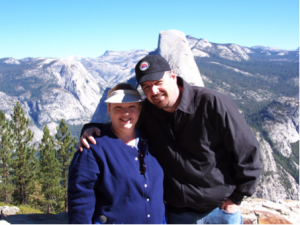Have you met PatientsLikeMe member Jeff, also known as NinerFan? He has been living with interstitial lung disease (ILD) since 2004 and he recently took some time to share his journey with us. He spoke about everything from getting diagnosed to being a newlywed, and gave a great list of advice for others going through a similar health experience.
In Dec 2004 we decided to move to another apartment and I was becoming so short of breath I couldn't take it. I was 37 and had gotten into the best shape of my life that year, so I knew that there was something wrong. I was getting night sweats and coughing, so I figured maybe bronchitis or something. My primary care physician (PCP) sent me for X-rays and they came back abnormal, not really viable because I could not take deep enough breaths, so I went for a CT scan. That's when I first heard the term ILD and I was scheduled to see a pulmonologist.
I did some web searching and got really worried. A week later the pulmonologist was arranging a biopsy. I didn't understand why, but we did it. I had my case sent to a specialist at UCSF, and they started me on treatment nine weeks after I first noticed symptoms. I was in terrible shape. The recovery from surgical biopsy was rough and my breathing was still very labored. But, a couple weeks later the prednisone kicked in and I was feeling better. I wasn't back to original shape, but I was able to walk around a bit without panting.
My new normal is what I call it. I could walk about 100 feet before I needed to stop and catch my breath, but forget about stairs or running ever again. I would need supplemental oxygen when walking any distances and for sleeping. My new normal left me at about 40% lung function, but it's enough to keep my saturation just above 90% on most days if I'm sitting. So at least I can work a desk job. This new normal has lasted about 8 years so far, and seems to be stable since about 4 months after treatment.
Being a 37 year old newlywed man and developing this was a tragedy of epic proportion. I have learned to deal with it, but have gone through times of deep depression. I cannot sugar coat this because my symptoms and condition have completely altered my life. I never can let go of what should have been or should be. But, knowing others that are much worse has opened my eyes to the quality of life I still have. I still get to work and provide for my wife and haven't missed more than a few days here and there dealing with this condition. And I know that there are opportunities for medical advances as long as I'm hanging in there. Also, should things worsen, I've known many that have lived richer lives over ten years after transplant and the advancements in that procedure are outstanding.
Hear are some warnings that I have learned the hard way and from others in the community.
- You are your best advocate, so be sure to stay on top of your appointments and get second opinions from specialist.
- Be careful to monitor yourself for side effects and secondary conditions because there are many.
- Be sure to create a support system with family and even online with others in your condition.
- If you need supplemental oxygen, then use it. You can develop other conditions if not.
- When you’re researching online, don't believe everything, especially in regard to life expectancy because most data is old and there are so many forms of ILD and progression.
- You will need CT exams regularly to check your progression or stability.
- If you got this from some kind of environmental or other trigger, you need to stop exposure to it forever.


